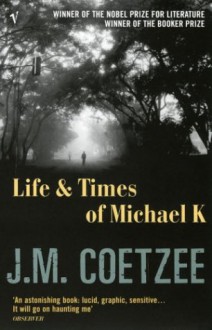
Ask me to pronounce verdict on a work of literature flaunting self-indulgent wordplay, revelling in its own brand of
avant-gardism which stops short of making a powerful statement on our troubled times, and my response to it is likely to be lukewarm.
Ask me to judge a book dissecting the greater human quandary with keen insight but in stilted prose, and my reaction will possibly be more or less the same.
But give me a story capable of dismantling all the divides of race, culture, political/religious indoctrination, time and space, encompassing all the inner contradictions of our existence into a compelling commentary on human follies that elicits a very visceral, emotional response, and my being won over is practically guaranteed.
Reading Michael K's tale took me on one such heart-breaking, metaphorical journey, at the culmination of which I realized that pitying the innocence of Michael Ks of the world who are repeatedly squashed like bugs under the bootsoles of the 'system' is but a foolish thing to do. Instead, I felt pity for the ones who are incapable of recognizing true misery when they see it, the ones who fail to identify the root cause of all human conflict and its futility, who pride themselves on their achievements which are, sometimes, nothing but grave mistakes in the greater scheme of things.
In spite of being born with genetic deformities and other crucial handicaps like the absence of a privileged background, Michael K is a fortunate being in my eyes. Someone who doesn't baulk at staring truth right in the eye, a venerable hero stranded in the midst of cowards. He can summon the moral strength to shun the comforts of life, deprived of which each one of us are bound to wither away and die the pathetic death of an unwatered plant. He can seek refuge in the heart of the inhabitable mountains, combat starvation by feasting on insects and the cherished pumpkins he cultivates with the tender care of a mother. He is brave enough to eschew the path prescribed by the ones positioned on the top most echelons of the social hierarchy. He doesn't know which side to choose during a war. So he chooses life over death, physical suffering over psychological enslavement, creation over destruction. Simply put, he deserts the company of men to embrace humanity.
"You are precious, Michaels in your way; you are the last of your kind, a creature left over from an earlier age, like the coelacanth or the last man to speak Yaqui. We have all tumbled over the lip into the cauldron of history: only you, following your idiot light, biding your time in an orphanage, evading the peace and the war, skulking in the open where no one dreamed of looking, have managed to live in the old way, drifting through time, observing the seasons no more trying to change the course of history than a grain of sand does. We ought to value you and celebrate you, we ought to put your clothes and your packet of pumpkin seeds too, with a label; there ought to be a plague nailed to the racetrack wall commemorating your stay here."
Despite being considered 'messed up in the head', he understands the one thing that others are too afraid or too ignorant to acknowledge. That laying the groundwork for a future way of life through ruthless violence blunts the human intellect to the point where one is only aroused by the urge to draw blood, inflict fatal injury and the application of reason loses its appeal.
Michael doesn't understand what a war is, so he struggles to flee the myriad horrors of it, clinging to the last shred of his dignity and his self-made definitions of right and wrong. As everything falls apart in the cities, in the labour camps, swallowed up by the chaos brought forth during war, Michael busies himself with creating and rebuilding life in the countryside.
Thus, Michael is nothing but a representation of that slumbering voice of reason within each one of us, the voice of the dissenter, the voice of the one putting up a passive but stubborn resistance against the absurd, inhumane demands of society at large. And that is precisely the reason why this world needs more silent revolutionaries like him.
P.S.:- My only grouse with Coetzee is his pedagogical compulsion to launch into a lengthy discourse, expounding on hidden meanings, instead of having faith in the perceptive reader to grasp underlying implications. That caused me to take away that 1 star which I had no intention of taking away otherwise.


 http://www.bbc.co.uk/programmes/b066ttr9
http://www.bbc.co.uk/programmes/b066ttr9 Episode 1 (of 2): Charles Arrowby, a distinguished theatre-director, decides to retire to a remote house by the sea in order to write his memoirs.
Episode 1 (of 2): Charles Arrowby, a distinguished theatre-director, decides to retire to a remote house by the sea in order to write his memoirs.  Episode 2/2: After encountering his adolescent love, Arrowby sets out on a mission to reclaim her and, in so doing, redeem the misdemeanours of his past. But a young man appears with a mission of his own.
Episode 2/2: After encountering his adolescent love, Arrowby sets out on a mission to reclaim her and, in so doing, redeem the misdemeanours of his past. But a young man appears with a mission of his own.
 Log in with Facebook
Log in with Facebook 








